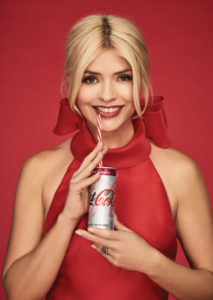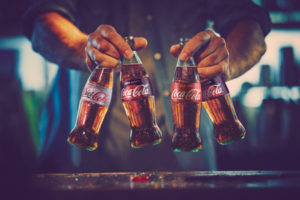CCEP: influencing and responding to trends
Gary Black (pictured), sales director for wholesale and convenience at Coca-Cola European Partners, highlights opportunities in the changing soft drinks industry.
 What proportion of your UK sales goes through cash & carries and delivered wholesalers?
What proportion of your UK sales goes through cash & carries and delivered wholesalers?
As a soft drinks manufacturer our range of products have a broader appeal and relevance than some FMCG categories which means you see our soft drinks in all independent environments, from pubs and bars to coffee shops and convenience stores. Wholesalers are the vital part of the chain that links us to these outlets and the consumers that shop in them, and we’re committed to supporting them by demonstrating the best way to tailor their soft drinks offer to meet the needs of their customer base.
We have expanded our team of experts that regularly call upon depots and also the retailers, publicans and foodservice operators that shop there. In fact, for 2018 we’re more than doubling our field sales visits nationwide to over 750,000 as part of our commitment to reaching more outlets, more often, and giving them the tools they need to increase their sales.
This year we have also introduced a new service to make it easier for independent operators to make an order with their chosen wholesaler. Our digital technology allows CCEP products to be added to the customer’s next delivery from their route to market in real time whilst one of our representatives is visiting their store. Customers therefore have the confidence that any out of stocks or new products are on the way as soon as the order is confirmed.
How has the introduction of the soft drinks industry levy affected your sales through the wholesale industry?
When the soft drinks tax came into force on 6 April, 95% of our soft drinks were already exempt. In fact, since 2005 we have launched 32 new drinks with no or less sugar, helping people reduce the sugar intake from our soft drinks offer.
Since 6 April the acceleration of low and zero-sugar variants in the wholesale channel has continued. For example, Coca-Cola Zero Sugar is the fastest growing cola brand in the convenience channel – up 30% (Nielsen) – and the second fastest growing soft drink brand – up 148% (CGA) – within the licensed sector. The brand is now worth well over £210 million in GB (Nielsen).
Coca-Cola Classic remains the most consumed cola in GB (BGS) and Diet Coke is the No.1 sugar-free cola (Nielsen). Both are widely distributed across all outlet types, but there are still distribution gaps for Coca-Cola Zero Sugar which presents a huge opportunity for our customers given its current growth rate. Space on shelf in depot and in retail outlets needs to grow to meet consumer demand and prevent out of stocks. In total, 70% of cola sales in the convenience channel come from our three cola brands (Nielsen).
 To support the growing demand for low and zero-sugar soft drinks, we launched three new flavoured variants this year – Diet Coke Exotic Mango, Diet Coke Feisty Cherry and Coca-Cola Zero Sugar Peach – to help wholesalers and retailers tap into the growing popularity of light colas. A staggering 4.7 million households in Great Britain buy flavoured colas and the category brings 340,000 incremental shoppers to the cola segment every year (Kantar). We’re committed to working with wholesalers to make the most of this trend.
To support the growing demand for low and zero-sugar soft drinks, we launched three new flavoured variants this year – Diet Coke Exotic Mango, Diet Coke Feisty Cherry and Coca-Cola Zero Sugar Peach – to help wholesalers and retailers tap into the growing popularity of light colas. A staggering 4.7 million households in Great Britain buy flavoured colas and the category brings 340,000 incremental shoppers to the cola segment every year (Kantar). We’re committed to working with wholesalers to make the most of this trend.
How can cash & carries and delivered wholesalers increase their soft drinks sales in light of so much NPD and product reformulation?
Our advice would be to pick the products that are being well supported by manufacturers and those that have been developed in response to consumer trends and from large or growing soft drink segments, and also to avoid duplication. Whilst choice remains important, ranges shouldn’t become too broad and confusing for shoppers. Wholesalers and their customers need to look at their sales data and trim the tail. Removing slower-selling lines will free up space and allow for multiple facings of best-sellers or the stocking of new products.
This year our large-scale innovations have been focused in five areas – light colas, flavoured carbonates, energy, flavoured water and ice tea – all segments that are large or demonstrating growth.
Our NPD has included the three flavoured light colas mentioned on page 16; Sprite Lemon Lime and Cucumber; Monster Energy Ultra Violet and Monster Energy Pipeline Punch; Fuze Tea – launched as part of CCEP’s strategy to evolve into a ‘total beverage company’; and Oasis Aquashock.
What impact did the CO2 shortage have on your supplies to the UK wholesale industry?
We successfully maintained the production of our soft drinks throughout the CO2 shortage, unprecedented weather conditions and World Cup period, continuing to fulfil orders and maintain strong customer service. We continue to maintain this service during our glorious summer.
How important are seasonal and sporting events to your business? Can you give some idea of the sales uplift you get from events like the World Cup?
Sporting events such as the FIFA World Cup are key trading periods that our licensed and retail customers can capitalise on. During this year’s World Cup the time zone difference meant that most of the games were screened in the afternoon or early evening, making the matches occasions for friends and entire families, many of whom would have enjoyed a soft drink. Whilst we don’t have the final results to hand, the World Cup, combined with favourable weather conditions, has had a positive impact on soft drink sales overall.
 With the school holidays still underway, the August Bank Holiday to come, and the warm weather likely to last until the end of September, there are still many BBQs, garden gatherings and pub social occasions that wholesalers, retailers and licensees can capitalise on.
With the school holidays still underway, the August Bank Holiday to come, and the warm weather likely to last until the end of September, there are still many BBQs, garden gatherings and pub social occasions that wholesalers, retailers and licensees can capitalise on.
Other occasions include Diwali, Halloween and Christmas. Key formats for such events include large PET bottles, multipack cans, and special themed packs from Fanta at Halloween and Coca-Cola at Christmas. Our 2018 festive activity will be unveiled soon.
Within the licensed channel, consumers are more likely to indulge in special drinks in the lead-up to Christmas and New Year, and to meet this demand, we have our premium range of mixers, Schweppes 1783. The five-strong range will be extended next month with Schweppes 1783 Muscovado, a mixer that marries perfectly with premium rum and whisky.
How is CCEP responding to consumers’ increasing concerns about plastic packaging and sustainability issues?
As the world’s largest independent bottler of Coca-Cola brands, we want to play an active role in supporting a circular economy and ensuring that all of our packaging is as sustainable as possible, while not compromising in any way on quality.
In July 2017, we launched a dedicated sustainable packaging strategy in GB, setting out our bold ambition to recover all of our packaging so that more is recycled and none ends up as litter. A year on we’ve made some strides towards our goals, including the recent announcement that all our large PET bottles will move to 40% rPET this year (all our bottles currently contain 25% rPET). We’re also putting more recycling messaging on our packaging.
To help clean up litter, CCEP supports a number of initiatives including Keep Scotland Beautiful, Keep Wales Tidy and Keep Britain Tidy. In fact, our first partnership with Keep Britain Tidy was back in 1965. Many of our CCEP colleagues took part in Keep Britain Tidy’s annual Great British Spring Clean weekend earlier this year.
Most recently we announced a partnership with Merlin Entertainments to offer discounts to some of the UK’s best-known attractions in exchange for empty plastic bottles. The initiative is designed to incentivise and encourage recycling on-the-go with specially created reverse vending machines located at the gates of Alton Towers Resort, Chessington World of Adventures, Thorpe Park and LEGOLAND Windsor.
How do you feel about working in such a dynamic industry?
Genuinely excited. We’re operating in a buoyant, growth category with an expanding portfolio of brands that are responding to an array of existing and emerging consumer trends. Our advancing use of technology is improving how we do business to the benefit our customers – our Add-To-Order capability is just one example of this. We are collaborating with customers more than ever before, using data to benefit both parties and exploring the online opportunity to drive sales.
Tel: Coca-Cola European Partners (01733) 828000

